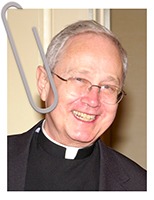 “Can a saint who lived four centuries ago have something to tell us Christians of the 21st century, men and women of post industrial society, of the technological world, of the space era, of the world of computers and the internet/web sites?” Noted Vincentian historian, José María Román, C.M. addressed this question in a presentation to the Daughters of Charity in Paris.
“Can a saint who lived four centuries ago have something to tell us Christians of the 21st century, men and women of post industrial society, of the technological world, of the space era, of the world of computers and the internet/web sites?” Noted Vincentian historian, José María Román, C.M. addressed this question in a presentation to the Daughters of Charity in Paris.
Some highlights from his answer in an article entitled the Religious Experience of Vincent …
1. “Vincent de Paul is not one of those saints from infancy, to whom a very special divine protection blessed him from his tender years with a celestial halo, that made of them objects of admiration rather than models to imitate.
But neither was Saint Vincent a repentant sinner, like Saint Augustine, who was saved by a powerful outburst of grace from the abyss of perdition to the summit of sanctity.
No. What was typical of Vincent de Paul is less spectacular and therefore more difficult: being a mediocre Christian, an average priest whom the slow work of grace marvelously transformed through a long process of purification and trials, of works and struggles, of a “forced” process of conversion towards becoming a saint who undertook admirable and great works.”
….
“2. Vincent de Paul will suffer all his life from the obsession to put the entire Church at the service of the poor, giving back to Christianity her most radical dimension and her most distinctive messianic characteristic.
He will try to lift the poor out of their corporal and spiritual poverty and to make the rich, the well-off and the lords put themselves at the service of the poor, making them understand that the only reason for having possession is to use them to aid their brothers and sisters in need and thus gain their own salvation.
Such conviction is based on three principles:…
And finally he writes
“3. Now we are living in a very different time from that of Saint Vincent de Paul. Nevertheless, there are many similarities that oblige us to consider fully the mission and message of Saint Vincent de Paul. Here are some of the more striking ones:
- Poverty in its new form in the midst of an affluent society and not only in the cities of the third world but also in the well developed countries; for example, the dreadful specter of unemployment, the scourge of HIV/ AIDS, the phenomenon of migration, and as we know, the endless threat of slavery.
- The dechristianization of large sectors of society which calls for a profound rethinking of the need for and urgency of a new evangelization as John Paul II repeatedly told us.
- The fact that, in each society, the marginalized are also those in greatest need of evangelization, like the peasants of the 17th century or probably worst than they were.
- The necessity for the Church to present itself before men as the incarnation of the universal mercy of the Lord, as emphasized by John Paul II in Dives in Misericordia and about which he wrote during the fourth centenary of Saint Vincent:

Rom 16, 13 reads: "Greet Rufus, chosen in the Lord; and greet his mother—a mother to me also." If this…
Have a blessed Holy Week!
I have never thought about the people that were named in the Gospels. I would agree that they may be…
Generally, I love the laconic nature of Mark's Gospel. The Passion narrative is very compelling in its starkness, with one…
Father John, Blessings to you as you step cautiously down that new path. Grace and Peace be with you!